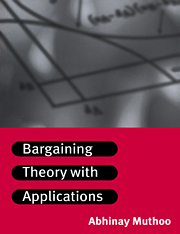10 - Repeated Bargaining Situations
Published online by Cambridge University Press: 24 November 2009
Summary
Introduction
In this chapter I study situations in which two players have the opportunity to be involved in a sequence of (possibly different and/or interdependent) bargaining situations. Such a situation will be called a ‘repeated’ bargaining situation (RBS). Examples of repeated bargaining situations abound. For instance: (i) in any marriage the wife and the husband are in a RBS, and (ii) in most bilateral monopoly markets the seller and the buyer are in a RBS. To illustrate the potential for interdependence amongst the bargaining situations in a RBS, consider a bilateral monopoly market for some input in which the seller and the buyer have the opportunity to be involved in a sequence of ‘one-shot’ transactions, and suppose that the buyer's reservation value for the input depends on the level of her capital stock. Since the price at which trade occurs determines the buyer's profit — which, in turn, determines her investment in capital stock — it follows that the buyer's reservation value in any one transaction is determined by the outcomes of past transactions. Hence, any pair of one-shot transactions are interdependent.
In Sections 10.2–10.4 I study repeated bargaining models, in which the outcomes of any pair of bargaining situations are negotiated separately, and moreover, the outcome of each bargaining situation is negotiated when (and if) it materializes. Although in the formal structure of these repeated bargaining models there is no reference to contracts, it is possible to provide the following contractual interpretation: the repeated bargaining models embody the notion that the RBS is governed by a sequence of short-term (or, limited-term) contracts.
- Type
- Chapter
- Information
- Bargaining Theory with Applications , pp. 295 - 332Publisher: Cambridge University PressPrint publication year: 1999



